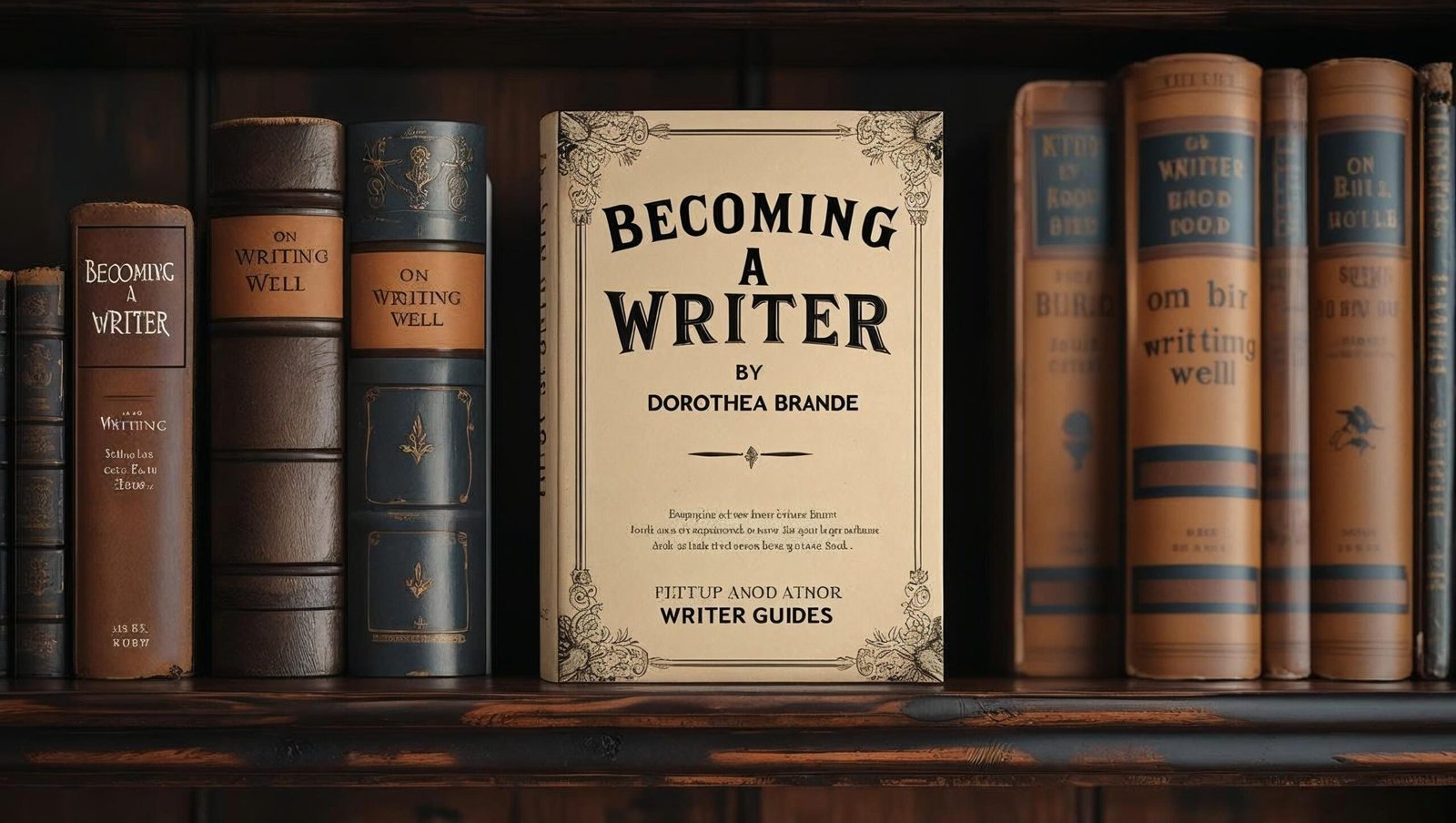Introduction: Rediscovering the Writer Within
The journey to becoming a writer is often paved with self-doubt, procrastination, and creative struggle. Long before the age of digital tools and writing hacks, Dorothea Brande wrote a timeless guide that continues to inspire. Becoming a Writer by Dorothea Brande, first published in 1934, is a profound yet practical manual that transcends time. Unlike technical handbooks, this book focuses on the psychology and discipline behind being a writer.
This blog post delves into seven key lessons from Becoming a Writer by Dorothea Brande that can transform not only how you write but also how you think as a writer.

1. Writing is a Dual Process: The Unconscious and the Conscious Mind
One of the most remarkable insights in Becoming a Writer by Dorothea Brande is the distinction between the unconscious and conscious faculties in the writing process. Brande emphasizes that good writing emerges when both the creative and critical minds are trained to work in harmony.
She asserts that inspiration alone is not sufficient; what matters is disciplined creativity. Her advice to train the unconscious through morning writing and daily rituals lays the groundwork for productive and original thought.
2. Establishing the Morning Writing Habit
A cornerstone of Becoming a Writer by Dorothea Brande is the practice of early morning writing. This exercise, which predates Julia Cameron’s “Morning Pages,” is designed to tap into the unconscious mind before daily distractions intrude.
Brande suggests that writers commit to writing immediately upon waking. This habit strengthens the creative muscle, enabling one to bypass inner censorship and access authentic thought. It’s not about crafting polished prose but about silencing the inner critic.
3. Cultivating the Writer’s Attitude
In Becoming a Writer by Dorothea Brande, the author underscores that to write well, one must first become a writer in mind and habit. She discourages the common tendency to wait for ideal conditions. According to her, a writer writes regardless of time, place, or mood.
Brande encourages aspiring authors to begin seeing the world through a writer’s lens—observing, noting, and interpreting human behavior. By cultivating curiosity and receptivity, writers can find stories everywhere.
4. Training the Will to Write
One of the most empowering chapters in Becoming a Writer by Dorothea Brande discusses the necessity of developing the will to write. Talent, she argues, is overrated if unaccompanied by discipline. She provides structured exercises to build willpower, such as setting specific times for writing and showing up consistently.
Brande advocates for separating the roles of writer and critic. During the creative process, the inner editor should remain silent. Only later should the critical mind revise. This dual operation demands mental training but results in writing that is both free-flowing and refined.

5. Embracing Solitude and Silence
Becoming a Writer by Dorothea Brande suggests that solitude is not a luxury but a necessity for writers. In a world cluttered with noise and distraction, cultivating silence allows one to hear the internal voice.
Brande proposes “silent walks” as a technique to engage the unconscious. She recommends going for long, solitary walks without talking or engaging with external stimuli. These meditative exercises nourish inner creativity and clarity.
6. The Role of Reading for Writers
A key recommendation from Becoming a Writer by Dorothea Brande is to read deeply and widely. Reading is not merely for entertainment; it is nourishment for the writer’s soul. Brande urges writers to read both for pleasure and analysis.
She also advises writers to reread favorite books to uncover the mechanics behind their emotional impact. By doing so, one learns to write not just correctly but compellingly. Writers who follow this practice often develop an intuitive sense of rhythm, tone, and structure.
7. Developing Confidence and Embracing Your Voice
One of the most lasting lessons from Becoming a Writer by Dorothea Brande is the importance of trusting your unique voice. She discourages imitation and overreliance on technical instruction. Brande believes that every person has a personal style waiting to be uncovered.
She insists that writing improves not through rigid rules but through practice, listening to one’s inner language, and writing consistently. Becoming a Writer by Dorothea Brande doesn’t teach “how to write” in a mechanical sense—it teaches how to become a writer.
The Psychology of the Writer: Unlocking the Inner Self
Much of the brilliance in Becoming a Writer by Dorothea Brande lies in its unwavering attention to the writer’s internal world. She dissects the writer’s emotional barriers, procrastination patterns, and mental resistance with surgical precision. Unlike typical instruction manuals, this book addresses why so many talented individuals never actually write.
Brande understood that psychological readiness was more crucial than grammatical excellence. She teaches that being a writer begins inside the mind, not at the typewriter. The emotional courage to confront one’s imagination and record it honestly is the real challenge, and Becoming a Writer by Dorothea Brande helps prepare the reader for this invisible war.
She emphasizes that doubts, fear of judgment, and a desire for perfection often kill creativity before it can breathe. That is why she designs her writing routines not just to spark productivity but to eliminate fear. Her approach provides psychological training for aspiring writers who feel creatively blocked.

Writers Are Made, Not Born
One of the most liberating ideas in Becoming a Writer by Dorothea Brande is her assertion that talent is not a mystical gift. Instead, she claims that writing is a skill—one that can be cultivated with consistent, conscious practice. This perspective is both comforting and empowering.
So often, people give up the dream of writing because they feel they lack “the gift.” Brande shatters this myth, stating that while some may have a natural inclination, it is discipline and mental conditioning that define a successful writer. According to Becoming a Writer by Dorothea Brande, anyone with a sincere passion for writing and the willingness to follow certain disciplines can become a competent—if not brilliant—writer.
Overcoming Resistance and Excuses
In modern productivity discussions, we often hear about resistance—Steven Pressfield calls it the “enemy.” Long before that, Brande explored the same concept in Becoming a Writer by Dorothea Brande. She addresses the subtle ways in which people delay their own progress—choosing distractions, inventing chores, and perpetually “planning to write.”
Brande not only calls this out, but she offers a battle plan against it. Her scheduled writing exercises force the writer to engage in action over perfection. She teaches that writing during uninspired moments is just as important as writing during moments of brilliance. This consistent practice, she insists, teaches the brain that writing is non-negotiable.
The Training of Both Selves: Artist and Critic
A revolutionary insight in Becoming a Writer by Dorothea Brande is her emphasis on developing the dual selves: the artist and the critic. These identities, often in conflict, must be trained to function in harmony. Most writers either lean too heavily into free writing without editing or become paralyzed by early self-criticism.
Brande provides separate, structured exercises for cultivating each self. She champions the idea that writing must first be emotional and instinctive—untouched by critique. Then, in a second pass, the editor self must step in with cool objectivity. Becoming a Writer by Dorothea Brande remains unique because it insists on building both these muscles independently before allowing them to work together.
This approach prevents premature editing from strangling creative flow, a trap into which countless new writers fall. Brande’s wisdom is clear: write first, edit later, but train for both.
Surrendering to the Routine
Much of the magic in Becoming a Writer by Dorothea Brande lies in its reverence for routine. To Brande, spontaneity is a myth when it comes to serious writing. Inspiration is rare, but routine is reliable. Therefore, she advocates for setting specific writing times and treating them with the same commitment as one would a professional appointment.
The discipline of writing at a designated time each day—even when uninspired—reconditions the brain to expect creativity on command. This mental rewiring transforms writing from a chaotic impulse into a deliberate practice. Becoming a Writer by Dorothea Brande offers a toolbox for this transition from amateur to professional mindset.
She even warns against sharing your writing too early with others. External validation or criticism can destabilize a fledgling routine. First, the writer must develop internal confidence and rhythm—only then should outside opinions be considered.

Mindfulness and Observation: Tools for Authenticity
Another powerful theme in Becoming a Writer by Dorothea Brande is mindfulness. Before mindfulness became a buzzword, Brande advocated deep observation and mental quiet as writing prerequisites. She asks writers to cultivate silence, practice noticing things, and even detach from conversations to simply observe human behavior.
This habit of detached attention, as she calls it, allows writers to witness life rather than merely participate in it. The result is richer, more authentic storytelling.
She even recommends specific exercises: enter a room and note every detail after leaving it; describe a stranger’s face in precise language; record a conversation’s emotional subtext. These practices sharpen the writer’s inner lens. Becoming a Writer by Dorothea Brande becomes not only a writing guide but a manual for perceiving life more vividly.
The Writer’s Inner Life and Emotional Discipline
Few books speak as wisely about the emotional inner life of the writer as Becoming a Writer by Dorothea Brande. Writing, at its core, is vulnerable work. It demands self-exposure, introspection, and emotional honesty. Brande understood that if a writer lacks emotional discipline, no amount of skill or routine will suffice.
She does not advise emotional repression but rather emotional mastery. Writers must feel deeply, but they must also choose when and how to channel those feelings into their work. Emotional discipline involves resisting the urge to vent or moralize and instead transforming emotion into art.
Writers who internalize this message will find themselves not only more productive but more honest and impactful. Becoming a Writer by Dorothea Brande insists on this inner transformation before outward success.
Legacy and Influence of the Book
Despite being written in the early 20th century, the influence of Becoming a Writer by Dorothea Brande endures. Numerous contemporary authors, from Julia Cameron to Anne Lamott, owe a spiritual debt to Brande’s philosophies. The book’s principles have found their way into writing workshops, MFA programs, and creative retreats globally.
Its enduring relevance speaks volumes about its depth. It does not rely on passing trends or genre-specific tricks. Instead, it addresses the foundational mindset required for lasting creativity. This is why Becoming a Writer by Dorothea Brande continues to be a recommended read across generations and continents.
If anything, in an age of digital noise and endless distractions, its message is more vital than ever. Writers need to return to simplicity, silence, and self-discipline—and this book provides the perfect compass.
Integrating Brande’s Teachings into a Digital Writing Life
You might wonder, how does a book like Becoming a Writer by Dorothea Brande fit into today’s world of AI content, Substack newsletters, and blogging? The answer lies in its core principle: the mind behind the writing is what truly matters.
The medium may have changed, but the process of creating meaningful writing remains human. The emotional truths, creative conflicts, and personal routines Brande explores are as applicable to a WordPress blogger as to a novelist. Her emphasis on building a practice, respecting the inner life, and observing the world can elevate digital content creation to an art form.
Whether you’re writing Instagram captions, self-help eBooks, or opinion columns, the spirit of Becoming a Writer by Dorothea Brande can enhance your authenticity and voice.

Why Every Writer Needs to Revisit This Classic
It’s tempting to dismiss older books in favor of newer, shinier writing guides. But some truths are timeless, and Becoming a Writer by Dorothea Brande delivers these with quiet power. In a culture obsessed with hacks and shortcuts, this book offers depth, discipline, and dignity.
Brande does not promise overnight success or viral fame. Instead, she promises transformation through effort. That’s why this book remains sacred to serious writers. It offers no gimmicks—only the truth that writing is hard but holy work, and that becoming a writer is a lifelong becoming.
To study this book is to study oneself.
Final Thoughts and Call to Action
If you feel stuck, uninspired, or disconnected from your creative core, then Becoming a Writer by Dorothea Brande is the book you didn’t know you needed. It won’t just make you write better—it will make you believe in your ability to write again.
Take the lessons seriously. Apply the routines. Embrace the silence. And most importantly, honor the writer you are becoming.
Published by: ShubhanshuInsights.com
Discover, Reflect, and Transform through Books.
FAQs
1. Is Becoming a Writer by Dorothea Brande suitable for beginners?
Absolutely. The book is crafted with the beginner in mind. It gently introduces core writing disciplines without overwhelming technicalities.
2. How does this book differ from modern writing guides?
Becoming a Writer by Dorothea Brande is more psychological than instructional. It focuses on the mindset, discipline, and emotional preparation required to be a writer rather than grammar and style.
3. Can this book help overcome writer’s block?
Yes. Brande’s exercises—especially morning writing and timed sessions—are effective tools for breaking through creative blocks.
4. Is it still relevant in today’s digital age?
Definitely. While technology has changed, the inner journey of writing remains timeless. The lessons from Becoming a Writer by Dorothea Brande are as applicable to bloggers and screenwriters today as they were to novelists in the 1930s.
5. What’s the best way to implement the lessons?
Start small. Dedicate a few weeks to morning writing, practice silent observation, and read deeply. Track your progress. The transformation will be gradual but real.
Conclusion: A Timeless Companion for Aspiring Writers
Whether you are a novelist, blogger, screenwriter, or journaler, Becoming a Writer by Dorothea Brande offers something invaluable—the tools to nurture your inner writer. It is not a book to read and forget; it is a manual to live by.
Dorothea Brande’s philosophy remains relevant because it addresses the person behind the pen. She reminds us that writing is not just a profession but a way of seeing and being. By embracing the practices in Becoming a Writer by Dorothea Brande, we become not only better writers but more attuned, creative human beings.
For those seeking authentic transformation in their writing life, this book is a quiet revolution.
Let your journey begin.
✍️ Comments from ShubhanshuInsights.com
-
“A beautifully structured review. You’ve convinced me to reread this classic with fresh eyes.”
-
“This isn’t just a book review—it’s a roadmap for every writer’s soul.”
-
“Incredible analysis. I especially loved the breakdown of the morning writing habit. Time to set my alarm early!”
-
“You captured the essence of Brande’s philosophy so eloquently. Thank you.”
Published by: ShubhanshuInsights.com
Let your creativity unfold, your discipline sharpen, and your inner voice grow louder with every written word. The path may be challenging, but the destination is deeply fulfilling and rewarding.